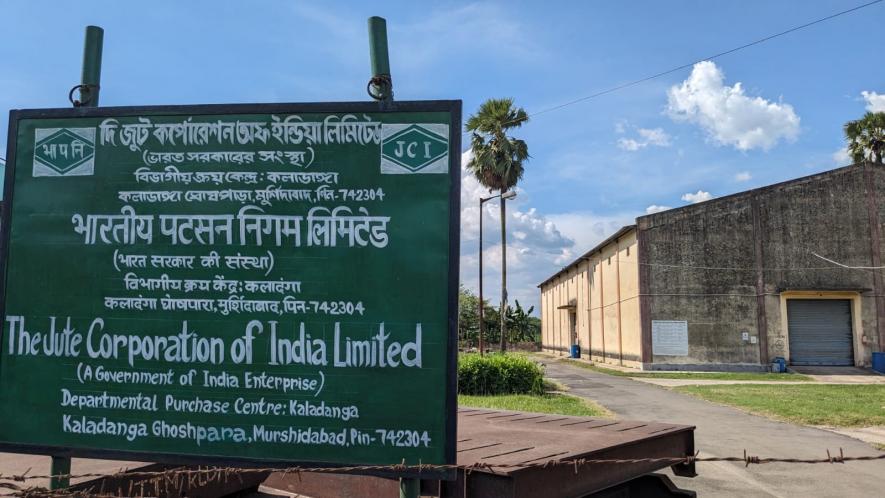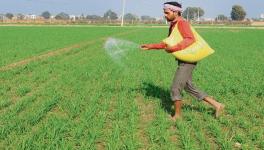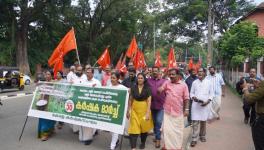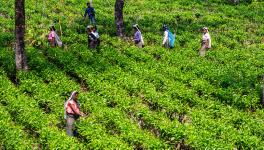West Bengal Jute Farmers hit by Scarce Rainfall, low MSP

The lack of adequate rainfall has severely impacted jute cultivation in West Bengal’s Cooch Behar. Farmers in the district, which produces an average of 1,71,300 metric tonnes (MT) of jute annually, cultivated the crop only on 38,800 hectares against the target of 45,000 hectares.
Consequently, Cooch Behar is expected to produce 1,20,000 MT of jute this year as fermenting hasn’t started in most areas due to inadequate water.
The average jute price in the open market has already tanked from Rs 3,030 per quintal last year to Rs 1,800-Rs 2,000.
“The jute market’s condition is not good. Farmers depend on the Jute Corporation of India (JCI) for the minimum support price (MSP). Distress selling has already started,” Balai Chandra Das, a jute cultivator from Dinhaata block preparing for the worst season, told Newsclick.
“The JCI enters the market late every year and buys the produce from middlemen. This year, a jute cultivator can sell a maximum of 70 quintals to the Corporation,” he added.
The JCI has decided to purchase the best quality jute for an MSP of Rs 5,750 per quintal and the average variety for Rs 5,050-Rs 3,725 at procurement centres in Mathabhanga, Changrabandha, Dinhata and Bhetaguri blocks.
The All India Kisan Sabha’s Cooch Behar unit has demanded an increase in the MSP and speedy procurement of jute from in the district.
In the neighbouring Jalpaiguri district, the production and quality of jute are expected to decline with caterpillars invading the fields.
Other jute-producing districts too have been impacted due to the lack of rainfall. “There has been no rainfall in the last 15 days,” said Mustak Alam, from Hariharpara of Murshidabad, who cultivated jute on 1.5 bighas hoping for rainfall. Last year, he lost Rs 10,000 due to inadequate rainfall.
According to Sujan Biswas of Dhaanyaganga Krishi Vigyan Kendra, Murshidabad had a 57% rainfall deficiency this year.
Most Murshidabad farmers were unable to ferment jute.Retting of jute is a fermentation process in which the cortical and phloem tissues of the bark of the plants containing free strands are decomposed to separate fibre from the non-fibrous woody stem. Some farmers are selling last year’s produce.
According to the State Agriculture Department, farmers cultivated jute on 1,05,000 hectares this year against 1,16,000 hectares in 2022.
Jute cultivation is decreasing with farmers worried about the poor quality of the produce last year and the erratic rainfall this year.
In Murshidabad, the JCI has 15 procurement centres, but farmers are unwilling to sell jute because of low MSP.
Due to the low MSP for the regular jute variety, farmers prefer to sell their produce to local vendors for Rs 5,000-Rs 4,000 per quintal. It also saves the cost of transporting jute to the market with vendors picking it up from villages.
Veteran farmer Ketab Ali, a resident of Daulatabad village, Murshidabad, said, “The jute quality has declined due to the lack of rain. JCI procurement centres refuse to buy our jute.” Some farmers said that they give 10 kg extra jute to sell their produce.
Murshidabad’s AIKS unit too has demanded an increase in jute MSP.
Get the latest reports & analysis with people's perspective on Protests, movements & deep analytical videos, discussions of the current affairs in your Telegram app. Subscribe to NewsClick's Telegram channel & get Real-Time updates on stories, as they get published on our website.























